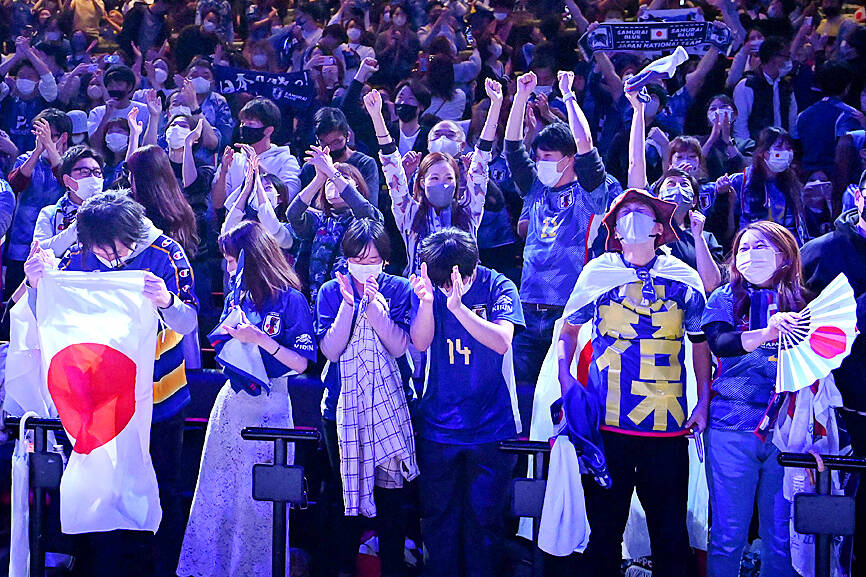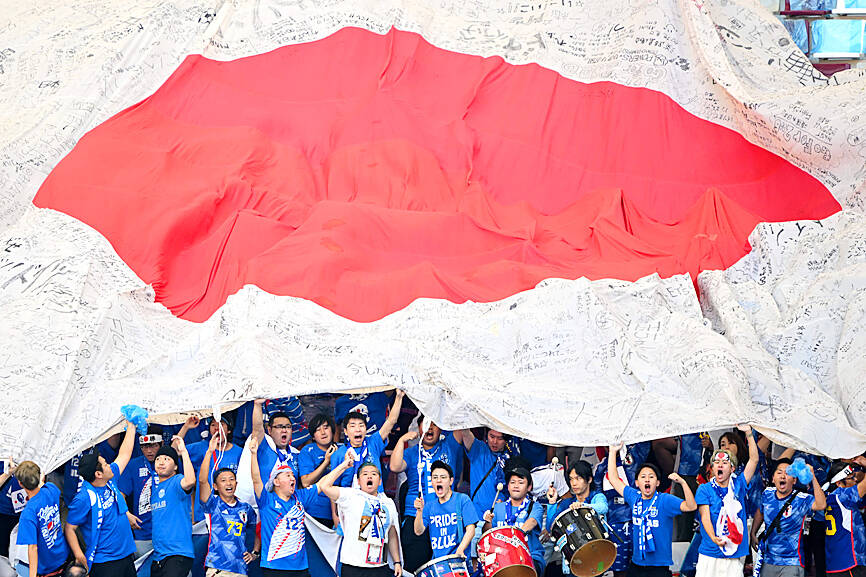The sight of Japanese fans at a World Cup bagging trash after a match — win or lose — always surprises non-Japanese. Japanese players are famous for doing the same in their team dressing room: hanging up towels, cleaning the floor and even leaving a thank-you note.
The behavior is driving social media posts at the World Cup in Qatar, but it is nothing unusual for Japanese fans or players. They are simply doing what most people in Japan do — at home, at school, at work or on streets from Tokyo to Osaka, Shizuoka to Sapporo.
“For Japanese people, this is just the normal thing to do,” Japan coach Hajime Moriyasu said. “When you leave, you have to leave a place cleaner than it was before. That’s the education we have been taught. That’s the basic culture we have. For us, it’s nothing special.”

Photo: AFP
A spokeswoman for the Japan Football Association said it is supplying 8,000 trash bags to help fans pick up after matches with “thank you” messages on the outside written in Arabic, Japanese and English.
Barbara Holthus, a sociologist who has spent the past decade in Japan, said that cleaning up after oneself is ingrained in Japanese culture.
“You’re always supposed to take your trash home in Japan, because there are no trash cans on the street,” said Holthus, the deputy director of the German Institute for Japanese Studies. “You clean your classroom. From a very young age you learn you are responsible for the cleanliness of your own space.”

Photo: AFP
Many Japanese elementary schools do not have janitors, so some of the cleanup work is left to the young students. Office workers often dedicate an hour to spruce up their areas.
“It’s partly cultural, but also the education structures have been training you for a long time to do that,” Holthus added.
This is Japan’s seventh straight World Cup, and their cleanliness began making news at their first World Cup in 1998 in France.
Prior to the 2020 Olympics, Tokyo Governor Yuriko Koike cautioned that visiting fans would have to learn to clean up after themselves.
However, the problem never materialized after fans from abroad were banned from attending the Games because of the COVID-19 pandemic.
Tokyo has few public trash receptacles. This keeps the streets cleaner, saves municipalities the costs of emptying trash cans and keeps away vermin.
Midori Mayama, a Japanese reporter in Qatar for the World Cup, said that fans collecting trash was a nonstory back home.
“Nobody in Japan would report on this,” she said, noting the same cleanup happens at Japanese professional baseball games. “All of this is so normal.”
It might be normal to Japanese, but Alberto Zaccheroni, an Italian who coached Japan from 2010 to 2014, said it is not how most teams act when they travel.
“Everywhere in the world players take their kit [uniform] off and leave it on the floor in the changing room. Then the cleaning staff come and collect it,” he said. “Not the Japanese players. They put all the shorts on top of the other, all the pairs of socks and all the jerseys.”

Shohei Ohtani and Clayton Kershaw on Friday joined their Los Angeles Dodgers teammates in sticking their fists out to show off their glittering World Series rings at a ceremony. “There’s just a lot of excitement, probably more than I can ever recall with the Dodger fan base and our players,” manager Dave Roberts said before Los Angeles rallied to beat the Detroit Tigers 8-5 in 10 innings. “What a way to cap off the first two days of celebrations,” Roberts said afterward. “By far the best opening week I’ve ever experienced. I just couldn’t have scripted it any better.” A choir in the

After fleeing Sudan when civil war erupted, Al-Hilal captain Mohamed Abdelrahman and his teammates have defied the odds to reach the CAF Champions League quarter-finals. They are today to face title-holders Al-Ahly of Egypt in Cairo, with the return match in the Mauritanian capital, Nouakchott, on Tuesday next week. Al-Hilal and biggest domestic rivals Al-Merrikh relocated to Mauritania after a power struggle broke out in April 2023 between the Sudanese army and a paramilitary force. The civil war has claimed tens of thousands of lives and displaced more than 12 million people, according to the UN. The Democratic Republic of the Congo-born Al-Hilal

The famously raucous Hong Kong Sevens are to start today in a big test for a shiny new stadium at the heart of a major US$3.85 billion sports park in the territory. Officials are keeping their fingers crossed that the premier event in Hong Kong’s sporting and social calendar goes off without a hitch at the 50,000-seat Kai Tak Stadium. They hope to entice major European soccer teams to visit in the next few months, with reports in December last year saying that Liverpool were in talks about a pre-season tour. Coldplay are to perform there next month, all part of Hong Kong’s

Shohei Ohtani, Teoscar Hernandez and Tommy Edman on Thursday smashed home runs to give the reigning World Series champions the Los Angeles Dodgers a 5-4 victory over Detroit on the MLB’s opening day in the US. The Dodgers, who won two season-opening games in Tokyo last week, raised their championship banner on a day when 28 clubs launched the season in the US. Dodgers manager Dave Roberts shuffled his batting lineup with all four leadoff hitters finally healthy as Ohtani was followed by Mookie Betts, then Hernandez and Freddie Freeman in the cleanup spot, switching places with Hernandez. “There’s a Teoscar tax to